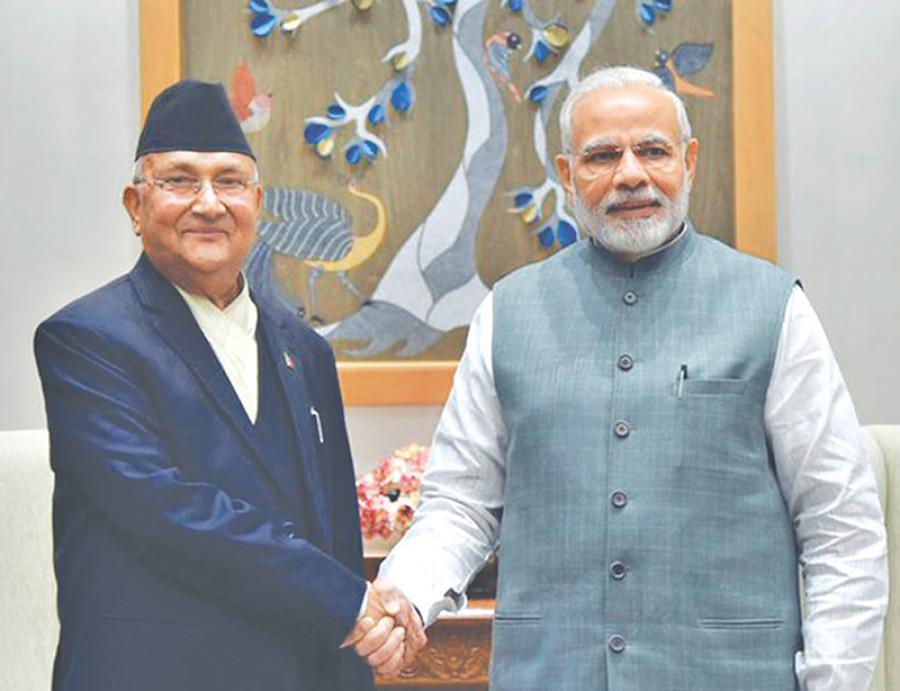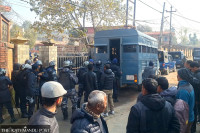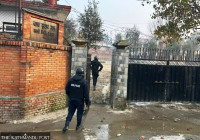Valley
Nepal-India panel report awaits Modi’s attention
The much-anticipated report of Eminent Persons’ Group on Nepal-India Relations is unlikely to be submitted to the prime ministers of both countries ahead of the general elections in India next year.
Anil Giri
The much-anticipated report of Eminent Persons’ Group on Nepal-India Relations is unlikely to be submitted to the prime ministers of both countries ahead of the general elections in India next year.
The eight-member EPG team—four each from Nepal and India—that prepared a single report after minor corrections in the first week of July has sought an appointment with Indian Prime Minister Narendra Modi to present it to him.
After Modi, Prime Minister KP Sharma Oli will receive the report before it comes into public domain for discussion and implementation. However, PM Modi is yet to give an appointment to receive the report though the Nepali side has been eagerly waiting to submit it to him first.
Nepali officials are optimistic the report will be submitted ahead of the Indian elections and will be implemented. However, multiple sources say the report is unlikely to be submitted to Indian PM ahead of India’s elections as New Delhi has some concerns on the report’s recommendations.
The EPG report only recommends suggestions. Both governments independently decide whether to implement the suggestions or not.
According to three sources privy to the matter, New Delhi’s reluctance to receive report stems from the content of the report.
The sources said New Delhi’s security and diplomatic officials are not convinced by the concept of ‘smart regulated border’ the report proposes. They say the EPG report is vague on this topic and lacks clarity.
New Delhi’s second apprehension is, Madhesis were not taken on board while forming the EPG and throughout the consultation process. This, officials said, gives New Delhi an excuse not to receive the report for the moment.
General election in India is the third concern. Any major diplomatic upheaval in the neighbourhood could snowball into election propaganda for the opposition parties in India. The Bharatiya Janata Party (BJP)-led ruling coalition would want to avoid any diplomatic issue with Nepal.
Senior leader of ruling Nepal Communist Party and former Deputy Prime Minister and Foreign Minister Narayan Kaji Shrestha told the Post, “Indians are not ready or willing to receive the report ahead of their elections, so it is going to push it further back.
“As per my understanding, New Delhi has some concerns on issues related to security, regulating open border and providing equal treatment to the citizens of both countries among others.”
Besides New Delhi, Madhes-based parties have reservations on the proposed “concept of smart border”. They are holding public meetings in various district headquarters of Tarai against “closing down the open border”. They have grave reservations over the absence of representatives from Madhes in the EPG and lack of consultation with Madhesi leaders and people on the border issue.
In the 1950 Peace and Friendship Treaty, the provision of security and providing reciprocal treatment to citizens by both countries is a major concern for Nepal and it wants to replace them. The alternative suggestion given by Nepal is vague, sources say.
“The EPG should represent people’s views living across the Tarai region,” said Rajendra Mahato, one of the presidiums of Rastriya Janata Party Nepal. “The importance of the open border cannot be determined from Kathmandu. It should be sensed and experienced locally. Any suggestion or alternative given from Kathmandu is not acceptable to us,” he said.
Spontaneous public gathering and awareness meetings are being held in many district headquarters in Tarai against the proposal to close the open border.
The EPG has proposed a smart border and suggested both sides to introduce identity card for those who cross the border. The EPG has also recommended limiting cross-border movements only through designated points to check infiltration, curb criminal activities, and maintain records of people crossing on either side of the border.
At present, people who cross either side of the Nepal-India border do not have to produce any identity card and there are no prohibited entry or exit points. The EPG report recommends making electronic national identity cards mandatory as well as limiting movement to designated border points.
Two EPG members representing Nepal, Nilamber Acharya and Rajan Bhattarai recently received new responsibilities as Nepal’s next ambassador to India and PM Oli’s foreign relations adviser respectively.
Speaking to the Post, Foreign Minister Pradeep Gyawali said there is probability of submitting the EPG report ahead of Indian polls.
“EPG is a good initiation undertaken by the two PMs,” said Gyawali, “The panel has prepared a good blueprint of Nepal-India ties and created a good foundation of our good relations. Yes, there’s delay in submitting the report, but I am confident that both the PMs will receive the report and implement it.”
EPG member Rajan Bhattari said the report awaits Indian PM’s perusal. He also dismissed talks of amending the contents of the report after it was completed on July 4.
“There are no changes. These are merely accusations. It is a serious task undertaken by the people trusted by the two countries so there is no chance of tampering with it,” Bhattarai said.




 20.12°C Kathmandu
20.12°C Kathmandu











